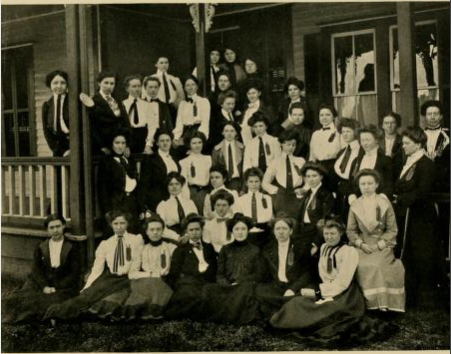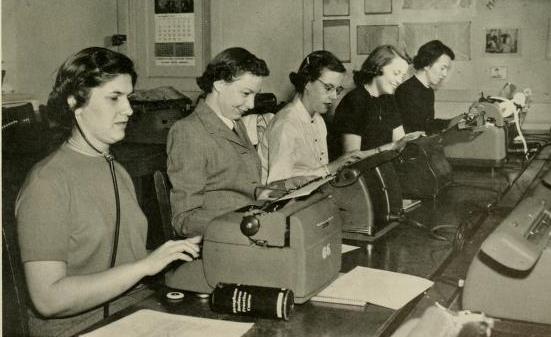UNCG at its opening in 1892 was known as the State Normal and Industrial School — “normal” referring to training for teaching and “industrial” referring to training for other work. A “Business Department” was among the founding departments of the school. This department is described in the institution’s first course catalog: “The business or commercial course, embracing such subjects as Stenography, Typewriting, Telegraphy, and Book-Keeping, is intended especially for those women who are thrown upon their own resources, but who do not care to teach.” By the second catalog, the name of the department has changed to the “Commercial Department.”
The course of study in the Commercial Department was intended to be completed within a single academic year, although some students who did not have the required prerequisite coursework from high school were required to take additional preparatory classes prior to beginning the program. Advanced courses were offered for those wishing to take classes after that first year. Promotional material from the department in the 1950s stated the benefit of this one-year training program on a college campus by noting that “students are able to experience a year of college life and at the same time acquire a marketable skill.” Graduates of the Commercial Department earned a certificate after completing the required coursework and demonstrating the ability to “write from dictation correctly in shorthand from general new matter at the rate of 80, 100, 125 (and above) words per minute.”
Students from across the state of North Carolina enrolled in the commercial program — and most stayed in North Carolina after completing the program. In fact, unlike the other academic departments in the school, residency in North Carolina was required for acceptance to the Commercial Department program. A report on the Commercial Department produced in the 1950s noted that “there is scarcely a town in North Carolina, from Manteo to Murphy, that has not been represented in some commercial class. There is scarcely an industry that has not employed students from the Department. Countless young women trained in the Department have been secretaries to the most prominent executives in the State, to Congressmen in Washington, to administrators in the Pentagon, to executives of CBS in New York.”
In response to increased demand for trained office workers in national defense during World War II, in February 1942, the Woman’s College enrolled its first Commercial Department students to begin their studies in the middle of the school year. Previously all students enrolled in the one-year program began their studies at the same time at the beginning the academic year. Forty-three women from across North Carolina enrolled for this “emergency commercial class.”
For its first 37 years, the Commercial Department was led by E.J. Forney (who also served as the college’s treasurer). Forney ensured that the coursework offered reflected the most recent technological innovations available for office work at the time. Training in new styles of shorthand and on the use of new machines meant that graduates of the Commercial Department were in high demand in the clerical labor market.
Separate from the Commercial Department, the college began a four-year degree program in Secretarial Administration in 1932. This new program included the same liberal arts foundation that was common to all of the college’s majors, and culminated in a bachelor of science degree. Outside consultants urged in 1954 that the Commercial and Secretarial Administration programs be merged, but ultimately the college decided, for the time, to maintain the separate one-year and four-year programs.
In the 1960s, however, enrollment in the Commercial Department declaimed sharply as lower-cost community colleges, technical institutes, and private business colleges began to attract the women looking for a one-year degree program. In 1967, faced with an enrollment of only 111 students, UNCG decided to terminate the Commercial Department and the one-year commercial program.
By Erin Lawrimore



